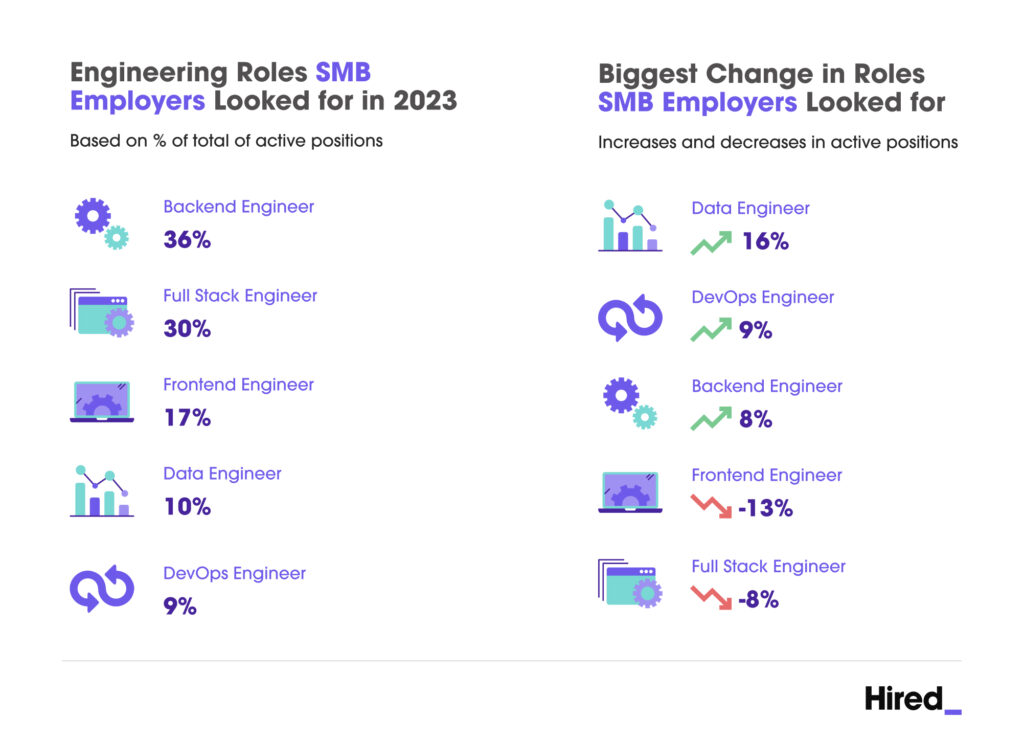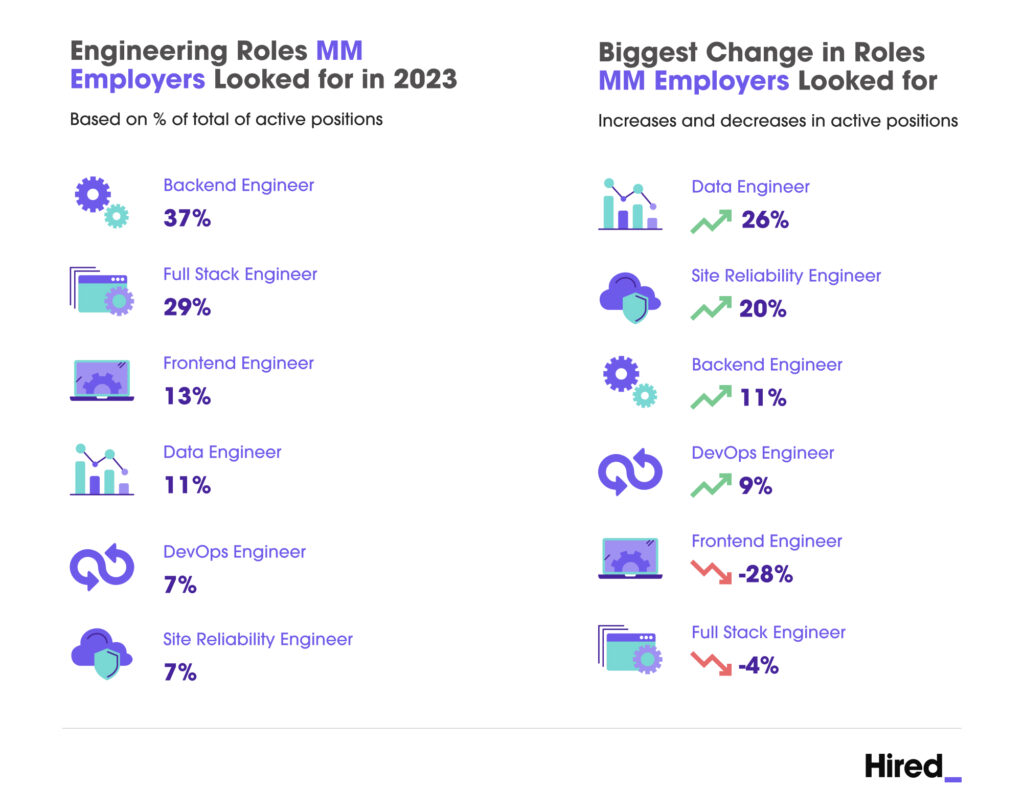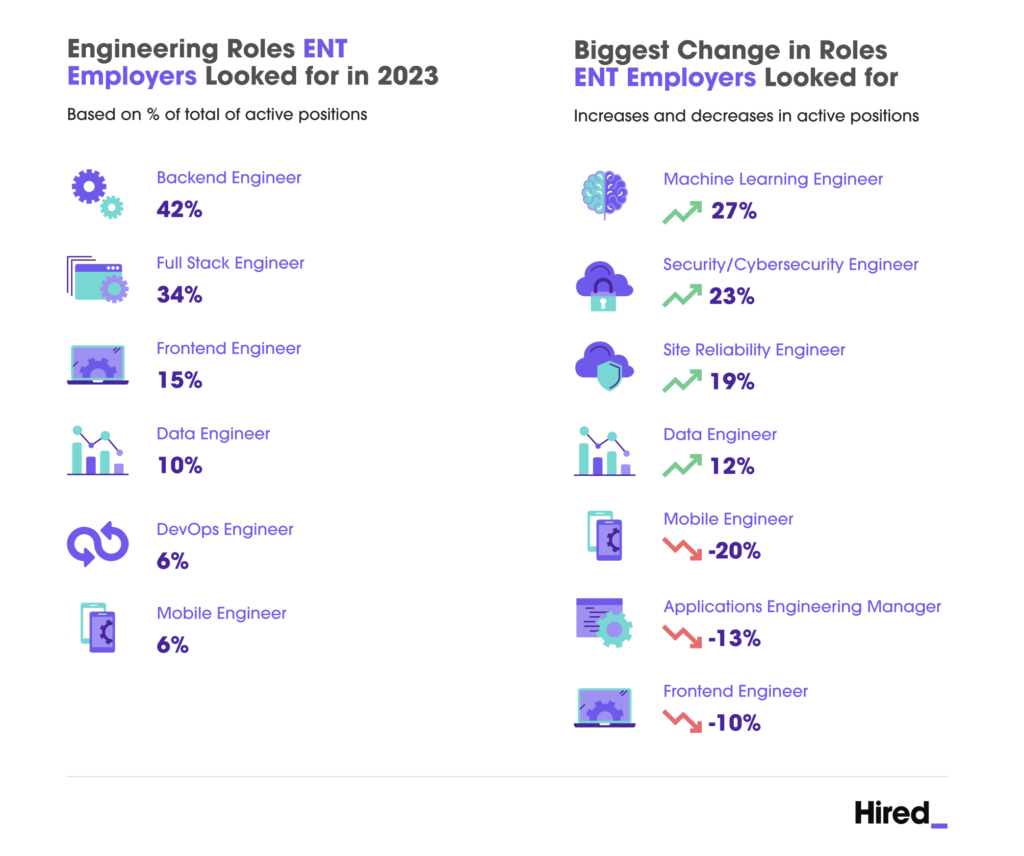New Research for Employers & Jobseekers
Trends in Software Engineer Specializations: 2024 Report
Roles employers want to fill and software engineering specializations most likely to secure an interview

Editor’s note: This is the second in a series on trends in software engineer specializations, tech skills, the impact of AI, salaries, hiring locations, the push for RTO vs. the pull of remote, and more.
After a tough year in the industry, it’s understandable jobseekers and employers alike are feeling cautious in 2024. For those in tech recruiting or looking for a new software developer job, it’s essential to understand the current market for software engineer roles — and where a prospective employer or employee might fit in.
So we’ve analyzed all of the software engineering positions active on the Hired platform in 2023 compared to 2022, looking for:
- Trends in overall demand for key specializations
- Differences in roles desired by companies of various sizes
- Competition among applicants with different specialties
We found the most dominant specializations have remained steady over the past three years. Backend Engineer, Full Stack Engineer, and Frontend Engineer consistently topped the list of most-posted and most-interviewed roles.
However, among the smaller specialties, interesting new trends are emerging, like a rising demand for Data Engineers and DevOps Engineers and a declining number of active open roles for Mobile Engineers.
Read on for our full analysis, including expert perspectives on the most revealing industry trends.
What software engineering specializations employers looked for in 2023 the mostIn 2023, the most highly sought-after specialization on the Hired platform was Backend Engineer, representing 40% of all active software engineer positions.
Full Stack Engineers were a close second, representing 34% of active software engineer positions on the platform, while Frontend Engineers were the third most in-demand specialization, representing 17% of active roles.
It’s not surprising these specializations top the most-posted charts – for the past three years, they also took the title of the top three most in-demand roles on our platform, based on the percentage of interview requests received.
Why are Backend Engineers so valuable?
According to Ale Paredes, Director of Engineering at Viam and Board Member of Latinas in Tech NYC, Backend Engineers are in demand because of “the increasing complexity of digital systems…
…These roles are instrumental in building the backbone of highly scalable and reliable distributed systems, which are important requirements for modern web applications and services.”
Hired CTO Dave Walters adds, “The increased focus by companies on security and performance also leads to demand for Backend Engineers, who often spend more time focused on these areas within the systems.”
Meanwhile, Full Stack Engineers bring great flexibility to teams
On the other hand, when it comes to Full Stack Engineers, adaptability is everything.
As Paredes explains, “Full Stack Engineers are highly valued for their versatility, as they possess the ability to manage and contribute across the entire technology stack (from frontend user interfaces to backend systems).
This flexibility makes them particularly valuable in a market that is increasingly budget-conscious and agile.”
Because Full Stack Engineers have relatively broad experience, Paredes says, they allow “businesses to pivot or expand their offerings with a smaller, more agile team, adept at handling a variety of tasks and challenges.”
Which emerging software engineer specializations are gaining popularity?Beyond the top three most popular software engineer specializations, there’s a more nuanced story about the industry’s changing shape.
To determine which roles are growing in favor among employers and which might be losing relevance, we looked at changes in the percentage of roles posted for specific specializations.
The rise of AI is clearly reflected on the Hired tech recruitment platform, with the share of listings for Machine Learning Engineers increasing by 43% from 2022 to 2023.
Related blog with video: How to Become a Machine Learning Engineer
Security and Cybersecurity Engineers were also more highly desired than in previous years, with a 30% increase in active postings overall dedicated to those roles year-over-year.
Jason Molt, Co-founder and CTO at MessageDesk underscores the relationship between these changes and the industry’s increased interest in AI.
He explains, “One of the biggest drivers you see today is the gold rush to utilize machine-learning systems to solve business problems, internally and externally (for their customers or built into their product).
Machine learning models are data-intensive, performance-sensitive applications that demand a lot of skill to research, deploy, and maintain effectively. As new cloud solutions scale, they encounter a variety of obstacles which exponentially increase the need for Site Reliability and Security talent.”
Walters says, “AI has been top of mind for CEOs and boards eager to stay competitive in the race to develop meaningful ways to leverage AI and GenAI to drive revenues and build efficiencies.”
“I expect the demand for Security and Cybersecurity Engineers to keep increasing in the foreseeable future as we face mounting cyber threats, increased regulatory compliance requirements, and as the world continues to become even more digital.”
Related: Tech Roles on the Rise! What Tech Roles Increased Most in Demand in 2023? Based on our 2023 State of Tech Salaries report, The Tech Hiring Tightrope, this blog looks at all tech roles on the Hired platform, including software engineers, product managers, data scientists, and more.
The software engineer specialization declining the most
The specialization with the biggest decrease in representation on the platform, as measured by the change in percentage of active positions, was Mobile Engineer (-19% YoY).
“This data supports my theory,” says Walters, “that much of this shift is a consequence of companies reallocating capital into AI and cybersecurity at a time when the tech industry has become more cost-aware.
Plus, we’ve achieved a reasonable saturation of the mobile market over the past few years allowing companies to invest less than before.”
Paredes commented on this change, noting that not only is the mobile application market approaching saturation but that “Many companies have mature mobile apps, shifting their focus to maintenance and updates rather than building new apps from scratch.
In addition, she explains, “Cross-platform development tools have made it easier to create apps for multiple platforms, while progressive web apps offer app-like experiences in web browsers, potentially decreasing the need for native apps in some cases.
This shift encourages a broader skill set in web technologies that can be applied across platforms, diminishing the demand for specialists in mobile development.”
Thoughts on platform decrease in demand for Mobile Engineers
Molt weighed in on the decreased interest in mobile engineers with a more philosophical stance, arguing, “System architects should aim to be agnostic about where their code can run and how their interfaces are consumed.
For many years, engineers have been siloed into roles like ‘iOS Swift Engineer.’ Just like we shouldn’t be worried about whether writing `n++` or `n+=1` is ‘better’ because compilers abstract away those concerns, our tools should make it so that engineers shouldn’t have to write platform-specific code.”
Software engineers, he argues, should no longer need to tie their specialization to a specific platform.
Trends in software engineering specialization hiring based on company sizeEditors note: When discussing company size, we base our segments on the number of employees. eSMB (1-75 employees), SMB (76-300), MM (301-1000), ENT (1000+).
While Full Stack Engineer, Backend Engineer, and Frontend Engineer held steady as the top three most sought-after roles on the Hired technical recruiting platform, the order varied in different segments.
Full Stack Engineer was the most desired role for emerging small business (eSMB) employers based on the percent of active positions (47%).
“It stands to reason,” says Walters, “the smaller the organization, the more they benefit from a flexible engineer who can handle the needs of a startup, and in some cases, may be the only Software Engineer on staff at first.
As businesses grow, it’s easier to budget for more software engineer specializations. Which ones will depend on their business goals, industry, and product or service.
Smaller teams are forced to be more efficient with their resources, expecting their engineers to cover more of the front and backend of their systems, they don’t have the luxury to specialize resources yet.”
To compare, Backend Engineer topped the list for SMB (36%), Mid-Market (37%), and Enterprise (42%) employers.
As with the overall rankings, the more revelatory data relate to year-over-year changes, indicating which emerging specialties are rising in popularity among employers of different sizes and which are declining.
Emerging Small Business (eSMB) trends
In addition to looking for the most popular specialties, eSMBs were looking for more Data Engineers than in previous years.
Representing 11% of total active eSMB positions, Data Engineers ranked fourth on the open positions list, just below Frontend Engineers.
Most notable, however, is not the number of open Data Engineer roles but the year-to-year change in demand. From 2022 to 2023, the proportion of eSMB active positions for Data Engineers increased by 32%.

Small Business (SMB) trends
Small businesses (SMBs) were also looking for more Data Engineers than before, with a 16% increase in the proportion of active positions year over year.
In addition, the SMB segment saw another emerging specialization in 2023: DevOps Engineer. With a 9% increase in the percentage of active positions, DevOps Engineer came in at number five on the list of roles desired by SMB employers.

Mid-Market (MM) Trends
The specialization rankings of mid-market businesses or scale-ups were somewhat similar to those of SMBs.
Mid-market employers sought Backend Engineers (37% of total active positions) and Full Stack Engineers (29%) in the greatest numbers in 2023, followed by Frontend Engineers (13%) and Data Engineers (11%).
As in other segments, Data Engineers were more sought-after than in 2022, represented by a 26% increase in the percentage of active positions for that role.
Tied for fifth place, DevOps Engineer and Site Reliability Engineer were each named in 7% of total active mid-market positions. Both were more popular than the previous year. The percentage of mid-market DevOps Engineer roles increased by 9% year over year, while the percentage of active mid-market Site Reliability Engineer roles jumped by 20%.

Enterprise (ENT) trends
A similar pattern held true for enterprise employers on the Hired platform. Backend Engineer (42% of total active positions), Full Stack Engineer (34%), and Frontend Engineer (15%) comprised most of the active enterprise roles.
Data Engineer came in at number four, representing 10% of the total active enterprise positions, a 12% increase from 2022.
DevOps engineer made number five on the enterprise list but was tied with a specialization that didn’t make the rankings for other company sizes: Mobile Engineer.
Despite declining in popularity (the percentage of active enterprise positions for Mobile Engineers decreased 20% year over year), Mobile Engineer roles still represented 6% of active enterprise positions.
And though they didn’t make the top five list for enterprise roles, Machine Learning Engineer and Security/Cybersecurity Engineer positions did exhibit remarkable growth. From 2022 to 2023, the percentage of active positions for each specialization increased by 27% and 23%, respectively.

The number of active positions for specific engineering specializations reveals important information about what employers seek. Still, it’s also critical for jobseekers and employers alike to understand the competitive market for each role.
We measure that by examining the number of interview requests (IVRs) candidates with certain specialties receive. When a particular role has less competition from qualified applicants, those who meet certain key requirements are more likely to receive an interview request.
In 2023, Backend Engineers received 55.6% of total software engineer IVRs on the Hired marketplace, down from 58.7% in 2022 and 59% in 2021.
This trend indicates that, even though Backend Engineers are the most sought-after software engineering specialization on Hired (based on the percentage of active positions), competition within the specialization is likely increasing.
Between a rock and a hard place?
Despite an increased number of open roles looking for Backend Engineers, applicants to those roles are slowly becoming less likely to receive an IVR.
The same trend holds true for Full Stack Engineers and Frontend Engineers. Though employers desire the specializations, individual applicants are growing less likely to receive IVRs.
The percentage of total IVRs received by Full Stack Engineers dropped by 10.4% between 2022 and 2023, while the percentage for Frontend Engineers fell 11%.
“As we regard the platform data, says Walters. “It’s important to note employers have enjoyed a flood of inbound applicants since the biggest waves of layoffs began. In some cases, an overwhelming amount, complicated by an influx of unqualified ones.”
I believe most companies hiring for the easier to fill roles in the current market, such as Backend, Frontend, and Full Stack, are finding suitable candidates from inbound or referrals, while using the Hired platform for sourcing more niche roles and skill sets.”
Inbound is generally the lowest ROI and quality channel because of the volume and lack of strategy. See our eBook: Too Many Inbound Job Applicants But Not Enough Qualified Ones? 8 Tactics to Solve It.
Demand for specialized developers is changing – but not by muchOver the past few years, the same three specialties have maintained their foothold in the industry. Backend, Frontend, and Full Stack Engineers appear to always be in demand.
Not only are they featured in a large proportion of active positions, but applicants also receive a large share of interview requests in the Hired marketplace.
For those looking to ensure career stability, one of these more popular specializations makes sense.
As Paredes explains, “[Backend] roles are foundational to almost every software application, ensuring long-term demand.”
Other roles, like Data Engineer and DevOps Engineer, are starting to gain a foothold. Still, for those looking to carve out a niche in a different sector of the industry, emerging specializations like Machine Learning Engineer and Cybersecurity Engineer could be worth exploring.
“DevOps can be a tough role to fill for employers,” says Walters. “It’s frequently harder to find the right candidate than for Backend, Frontend, and Full Stack Engineers.”
Paredes recommends that those looking “for significant growth potential” consider “specializing in Machine Learning, Data Engineering, or Cybersecurity.
These fields are rapidly evolving, offering opportunities to be at the forefront of innovation. These same domains also offer strong earning potential due to the immense value they can bring to businesses.”

Editor’s note: coming soon – our look at trends in software engineer salaries. In the meantime, feel free to check out Hired’s tech salary calculator tool.
The tech industry is for lifelong learners
No matter what specialization you gravitate towards, Paredes and Molt recommend investing in the basics.
“In an era that prizes speed,” Paredes says, “dedication to mastering the core principles may seem daunting. However, this investment is your compass in the ever-evolving tech landscape, ensuring your skills remain both relevant and in high demand.”
Related: Trends in Software Engineer Tech Skills: 2024 Report
Molt expresses a similar sentiment, arguing that “engineers should not see themselves through the lens of a particular tool.” Instead, he suggests they study “leadership, data-intensive systems, security, systems reliability engineering, and math.
Technology is not a pleasant industry for people who think they are finished learning because the landscape changes every year…The highest actualization of the engineering discipline is to act as a true technologist who is not anchored to specific frameworks and toolsets.”
Walters agrees 100%, saying, “Technology continues to change at a fast pace. It’s one of the reasons I love it. Those of us working in the technology industry must keep up with the pace of change to stay relevant and competitive in the market.”
Related: Job Searching? Check out this blog, 7 Ways to Stay Competitive in Tough Job Markets.
Are you an employer ready for a better tech recruitment and hiring solution?Hired offers many services and products to tailor recruiting and hiring solutions for businesses of all sizes. Whether you’re a startup without a recruiting team or a global enterprise requiring greater efficiency and flexibility, we’re here to help with self-serve and support options.
Hired maintains a global tech talent pool and provides teams with an intuitive platform, DEI features, response rates above 60%, higher-quality candidates, and more efficiency through transparency into salaries and preferences.
Save time through greater alignment. No guessing, just better matches. Need help? We offer turnkey coding challenge campaigns to build your talent pipeline and surface even more candidates with tech skills in demand or hard-to-find specializations.
TA team stretched thin? Engineering managers busy managing? Hired also offers short or long-term talent sourcing services to screen and shortlist candidates.
Need guidance? Dedicated Customer Success Managers (real humans!) are with you along the way.
Check out our resources for employers and learn how Hired works for employers like you. Or, hear all about it when you…
Are you looking for a new role in software engineering?
As a dual marketplace, Hired also helps tech talent find new roles based on matching tech experience and skills, as well as salary and work model preferences. See how Hired works for jobseekers or sign up directly. It’s free for talent, from start to finish! We also offer career guidance and job searching resources for tech talent.
If you’re already on the Hired platform and want to explore opportunities to skill up or attend a bootcamp, see our partnership directory. If you want to better showcase your skills – earn a badge for your profile using Assessments. Review our events page for upcoming coding challenges and webinars on demand.
For methodology, please see the main software engineer trends page.
Tech recruiting & hiring research reports
Dive into more proprietary research on tech salaries, software engineering sentiments, and wage inequality in the industry.
-
Report
2023 State of Software Engineers
2023 report providing proprietary platform and survey data from tech employers and software engineers.
-
Report
The Tech Hiring Tightrope; 2023 State of Tech Salaries
Detailed and data-backed insights to adapt and keep moving forward in the hiring market.
-
Report
State of Wage Inequality in the Tech Industry 2023 Research Study
A review of wage bias, opportunity and expectation gaps, and the impact of DEI.
Helpful technical recruiting articles

The Ultimate List: 49 Questions to Ask Engineering Managers
Sample questions in several categories plus – what hiring managers should listen for in...

Hiring Tech Talent Now: A Comprehensive Guide
The tech industry has increasingly become a driving force for economic progress. So, hiring tech...

Best Reverse Interview Questions & How to Offer Reverse Interviews
Reverse interviews, although not as common as traditional ones, are effective assets in the hiring...
